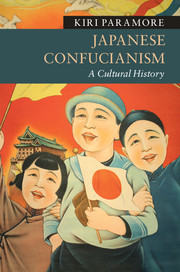Book contents
- Frontmatter
- Epigraph
- Contents
- List of figures
- List of maps
- Acknowledgments
- Notes on the text
- Timeline
- Maps
- Introduction
- 1 Confucianism as cultural capital (mid-first millennium CE–late sixteenth century CE)
- 2 Confucianism as religion (1580s–1720s)
- 3 Confucianism as public sphere (1720s–1868)
- 4 Confucianism as knowledge (1400s–1800s)
- 5 Confucianism as liberalism (1850s–1890s)
- 6 Confucianism as fascism (1868–1945)
- 7 Confucianism as taboo (1945–2015)
- Epilogue: China and Japan: East Asian modernities and Confucian revivals compared
- Notes
- Works Cited
- Index
5 - Confucianism as liberalism (1850s–1890s)
Published online by Cambridge University Press: 05 April 2016
- Frontmatter
- Epigraph
- Contents
- List of figures
- List of maps
- Acknowledgments
- Notes on the text
- Timeline
- Maps
- Introduction
- 1 Confucianism as cultural capital (mid-first millennium CE–late sixteenth century CE)
- 2 Confucianism as religion (1580s–1720s)
- 3 Confucianism as public sphere (1720s–1868)
- 4 Confucianism as knowledge (1400s–1800s)
- 5 Confucianism as liberalism (1850s–1890s)
- 6 Confucianism as fascism (1868–1945)
- 7 Confucianism as taboo (1945–2015)
- Epilogue: China and Japan: East Asian modernities and Confucian revivals compared
- Notes
- Works Cited
- Index
Summary
Money is provided and medicine, clothes and food sought for the sustenance of vagrants. Ah, here [Massachusetts] benevolent governance surpasses that of China or Japan!
(Niijima Shimeta (later Niijima Jō) in an 1867 letter to his father (Niijima 1977: 17))Modern academic writing has a long tradition of portraying Confucianism as inherently opposed to the politics of Western modernity. Writing on modern Japanese history often locates Japanese resistance to political Westernization, notably including democracy and liberalism, in the Confucian tradition (Hall 1955; Ooms 1985). Yet the earliest positive Japanese assessments of Western governance in general, and democracy, liberalism, and egalitarianism, in particular, were made through Confucian lenses and argued in Confucian terms by Confucian scholars. These positive Japanese Confucian assessments of Western governance were even sometimes arrived at through the mediation of Qing Chinese writing. The Chinese scholar Xu Jiyu (1795–1873) put forward a positive Confucian assessment of modern Western civilization in a tract already published in China in 1850. It was popular enough in Japan to warrant reprinting there in 1861 (Xu 2000). Just like the scientific and strategic analysis discussed in the previous chapter, Japanese ideas on governance as late as the Meiji Restoration were arrived at through a transnational transmission of ideas based in the language of Classical Chinese and the vocabularies of Confucianism. China was still the intellectual mid-wife, even at the birth of Meiji Japan's process of Westernization – a process which would quickly become deeply anti-Chinese.
This chapter will focus on the way the legacy of Tokugawa Confucianism shaped the emergence of the Westernized modern order in Japan. The basis of late Tokugawa intellectual education was Confucian and the core of the Confucian message transmitted was political. It should therefore come as no surprise that the field of human activity over which Confucianism demonstrated the most sustained influence through the dramatic transformation of Japan to a modern Western-style society was politics. In particular, Japanese approaches to liberalism, the dominant political ideology of late nineteenth-, twentieth-, and twenty-first-century global capitalism, was heavily inflected by Confucianism. This chapter will focus on this Confucian role in the development of Japanese liberalism, looking at how some of the most quintessentially Western and modern models of political thought and institutionalism were reimagined in Japan through Confucianism.
- Type
- Chapter
- Information
- Japanese ConfucianismA Cultural History, pp. 118 - 140Publisher: Cambridge University PressPrint publication year: 2016

